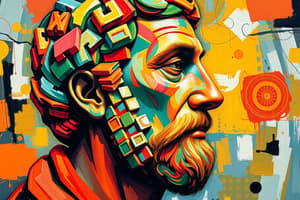Podcast
Questions and Answers
Which philosophy emphasizes wealth distribution over communal means of wealth?
Which philosophy emphasizes wealth distribution over communal means of wealth?
- Conservatism
- Marxism (correct)
- Metaphysics
- Anarchism
What is one of the key contributions of philosophy according to the content?
What is one of the key contributions of philosophy according to the content?
- Creating economic models
- Improving problem-solving and decision-making (correct)
- Promoting artistic expression
- Establishing political systems
Which philosopher emphasized the necessity of philosophizing due to life experiences?
Which philosopher emphasized the necessity of philosophizing due to life experiences?
- Socrates
- Mortimer J. Adler
- Immanuel Kant
- Karl Jaspers (correct)
What does Anarchism primarily oppose?
What does Anarchism primarily oppose?
Which area of philosophy seeks to understand humans from a philosophical perspective?
Which area of philosophy seeks to understand humans from a philosophical perspective?
Socrates is known for stating that which of the following is essential?
Socrates is known for stating that which of the following is essential?
What subsection of philosophy deals with questions regarding reality and existence?
What subsection of philosophy deals with questions regarding reality and existence?
In philosophical discussions, what is emphasized as a critical factor for self-development?
In philosophical discussions, what is emphasized as a critical factor for self-development?
What does Aristotle's sense of wonder primarily drive humans to do?
What does Aristotle's sense of wonder primarily drive humans to do?
Which theorem is Aristotle attributed to formulating?
Which theorem is Aristotle attributed to formulating?
What is the process of deductive reasoning primarily used for?
What is the process of deductive reasoning primarily used for?
According to Heraclitus, what is a fundamental characteristic of change?
According to Heraclitus, what is a fundamental characteristic of change?
What philosophical movement is characterized by a social and economic belief in shared wealth?
What philosophical movement is characterized by a social and economic belief in shared wealth?
What did Rene Descartes emphasize about scientific ideas?
What did Rene Descartes emphasize about scientific ideas?
What enables a person to engage in critical analysis of concepts and arguments?
What enables a person to engage in critical analysis of concepts and arguments?
What does political philosophy primarily study?
What does political philosophy primarily study?
What does the term 'logos' refer to in the context of Heraclitus' philosophy?
What does the term 'logos' refer to in the context of Heraclitus' philosophy?
Which of the following statements is true regarding facts?
Which of the following statements is true regarding facts?
How does doubt influence the understanding of right and wrong?
How does doubt influence the understanding of right and wrong?
Which statement reflects the concept of coherence in relation to knowledge?
Which statement reflects the concept of coherence in relation to knowledge?
What can be inferred about moral decisions in the context of knowledge?
What can be inferred about moral decisions in the context of knowledge?
Which branch of philosophy deals with moral questions and dilemmas?
Which branch of philosophy deals with moral questions and dilemmas?
What is required for a person to engage in reflection?
What is required for a person to engage in reflection?
What term describes a statement about the world that may or may not carry truth?
What term describes a statement about the world that may or may not carry truth?
How is truth defined in the context provided?
How is truth defined in the context provided?
What drives our desire to discover the truth according to the content?
What drives our desire to discover the truth according to the content?
Which of the following best defines 'facts' according to the discussion?
Which of the following best defines 'facts' according to the discussion?
What does epistemology discuss?
What does epistemology discuss?
What defines an opinion in the context provided?
What defines an opinion in the context provided?
What does the term 'confirmation bias' refer to?
What does the term 'confirmation bias' refer to?
Which fallacy assumes that what is true of a part is also true for the whole?
Which fallacy assumes that what is true of a part is also true for the whole?
What is the meaning of 'personhood'?
What is the meaning of 'personhood'?
What does 'human nature' refer to?
What does 'human nature' refer to?
What is an example of 'hindsight' in reasoning?
What is an example of 'hindsight' in reasoning?
The term 'framing' in reasoning refers to what?
The term 'framing' in reasoning refers to what?
Which of the following best describes a 'human being'?
Which of the following best describes a 'human being'?
How does 'cause-and-effect' reasoning manifest incorrectly?
How does 'cause-and-effect' reasoning manifest incorrectly?
Flashcards are hidden until you start studying
Study Notes
Aristotle's Contributions
- Sense of Wonder: Human curiosity drives individuals to pose profound questions, often without clear answers.
- Critically engaged with mathematics and science, credited for formulating the Pythagorean theorem.
- Established a community dedicated to the study of religion and philosophy.
- Ideas are rooted in perception and reality, influencing methods of reasoning.
- Introduced deductive reasoning, enabling conclusions based on specific statements.
Philosophical Inquiry
- Doubt: Emphasizes the need for scientific ideas to be tested before acceptance as truth.
- Experience: Encounters with challenging situations provoke philosophical reflection on one’s beliefs.
- Love of Wisdom: Advocates for a relentless pursuit of truth and self-examination, as stated by Socrates.
Branches of Philosophy
- Aesthetic: Investigates concepts of beauty and the nature of "what is beautiful."
- Logic: Focuses on correct reasoning processes.
- Epistemology: Explores the nature and scope of knowledge.
- Ethics: Examines moral dilemmas, determining right from wrong and the concept of a good life.
- Political Philosophy: Analyzes government structures, justice, power, and citizenship responsibilities.
Philosophical Perspectives
- Three views on humanity:
- Scientific perspective focuses on biological and physical aspects.
- Philosophical perspective centers on abstract reasoning and existential questions.
- Theological perspective encompasses spiritual interpretations of human existence.
Key Concepts in Philosophy
- Truth: Defined as coherence with reality, requiring empirical evidence.
- Knowledge: Represents undeniable understanding, cannot be wrong or false.
- Facts: Observations regarded as true and real.
- Opinions: Subjective beliefs that may hold varying degrees of truth.
Reflective Engagement
- Reflection: Involves critical self-examination of thoughts, feelings, and actions.
- Doubt: Serves as a catalyst for seeking truth and understanding.
Human Terminology
- Man: A general term for the entire human race.
- Human Being: Distinguishes humans from other animal species.
- Person: A complex term denoting an individual with certain rights and responsibilities.
- Personhood: Denotes the status of being regarded as a person.
- Human Nature: Encompasses the attributes that set humans apart from other living beings.
Logical Fallacies
- Cause-and-Effect: Mistakenly attributing causation to unrelated events.
- Fallacy of Composition: Assuming collective truths from individual cases.
- Fallacy of Division: Incorrectly applying part truths to the whole.
- Confirmation Bias: The tendency to favor information that aligns with pre-existing beliefs.
- Framing: Highlighting certain aspects of a situation while ignoring others.
Conclusion
- The coherence of knowledge and facts is akin to fitting pieces of a jigsaw puzzle, highlighting the importance of contextual understanding.
Studying That Suits You
Use AI to generate personalized quizzes and flashcards to suit your learning preferences.




